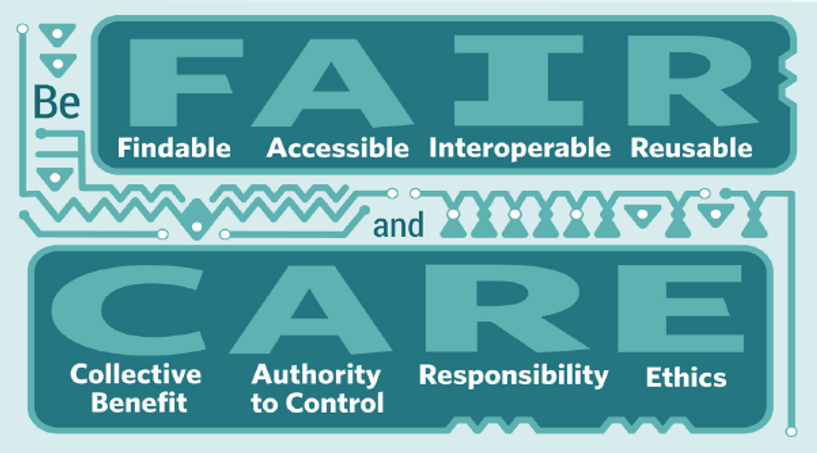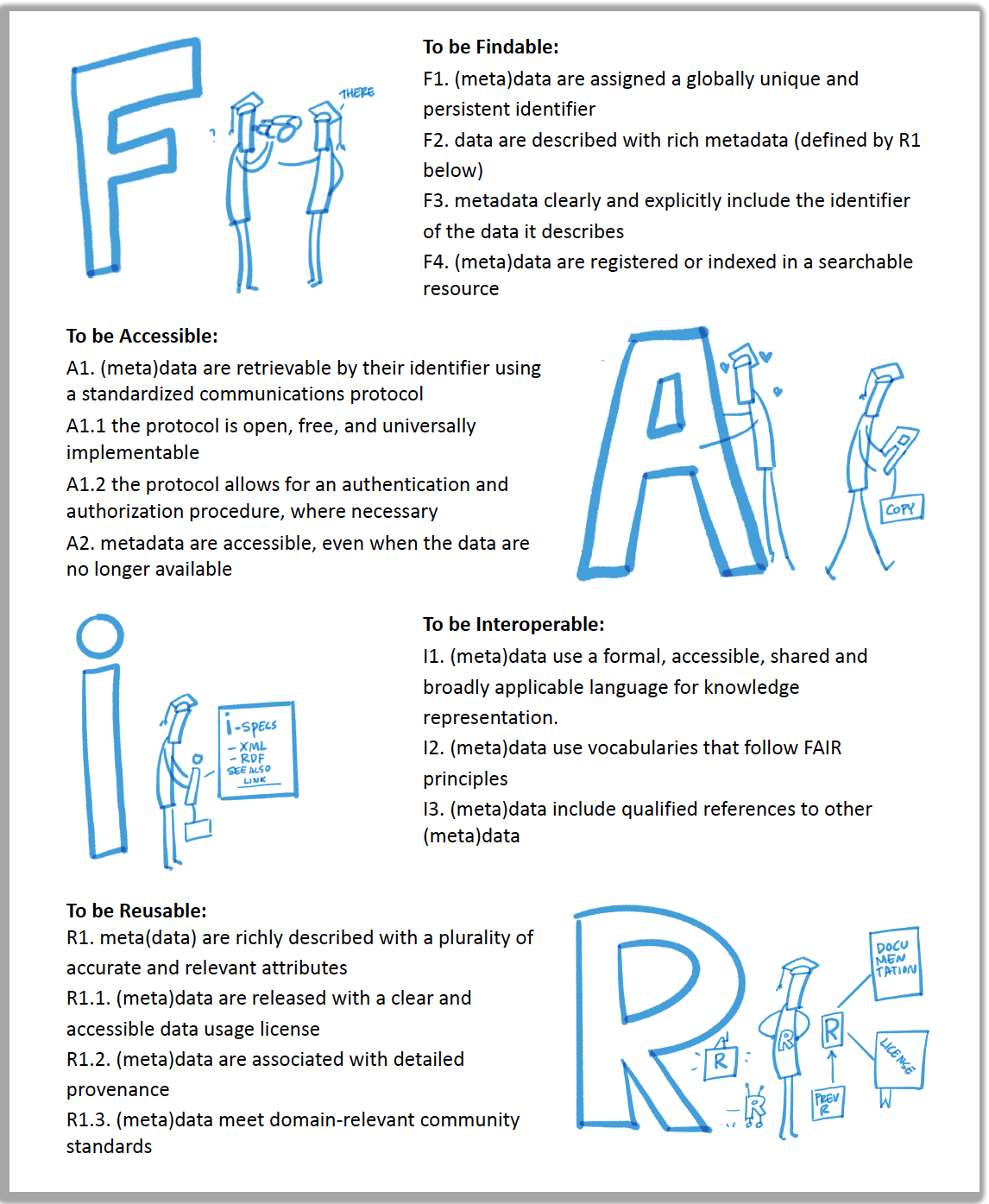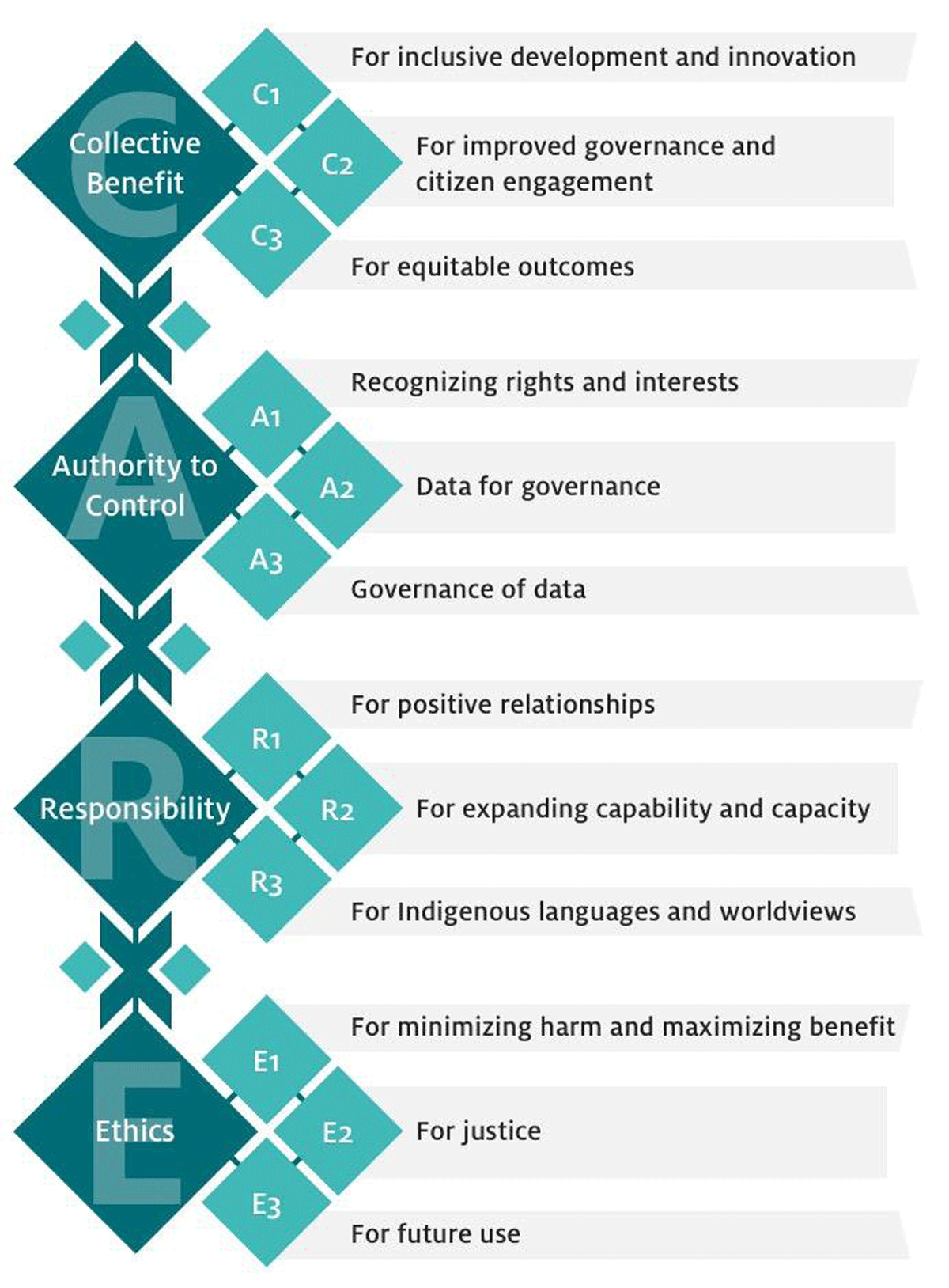Learning Objectives
- Introduce FAIR and CARE principles and the value it provides to data
- Provide a FAIR and CARE lens that can be applied to your data-focused work
- Evaluate the FAIRness and CAREness of your work and the work of others
9.1 The FAIR and CARE Principles
The idea behind these principles is to increase access and usage of complex and large datasets for innovation, discovery, and decision-making. This means making data available to machines, researchers, Indigenous communities, policy makers, and more.
With the need to improve the infrastructure supporting the reuse of data, a group of diverse stakeholders from academia, funding agencies, publishers and industry came together to jointly endorse measurable guidelines that enhance the reusability of data (Wilkinson et al. (2016)). These guidelines became what we now know as the FAIR Data Principles.
Following the discussion about FAIR and incorporating activities and feedback from the Indigenous Data Sovereignty network, the Global Indigenous Data Alliance developed the CARE principles (Carroll et al. (2021)). The CARE principles for Indigenous Data Governance complement the more data-centric approach of the FAIR principles, introducing social responsibility to open data management practices.
Together, these two principle encourage us to push open and other data movements to consider both people and purpose in their advocacy and pursuits. The goal is that researchers, stewards, and any users of data will be FAIR and CARE (Carroll et al. (2020)).
9.1.1 What is FAIR?
With the rise of open science and more accessible data, it is becoming increasingly important to address accessibility and openness in multiple ways. The FAIR principles focuses on how to prepare your data so that it can be reused by others (versus just open access of research outputs). In 2016, the data stewardship community published principles surrounding best practices for open data management, including FAIR. FAIR stands for Findable, Accessible, Interoperable, and Reproducible. It is best to think about FAIR as a set of comprehensive standards for you to use while curating your data. And each principle of FAIR can be translated into a set of actions you can take during the entire lifecycle of research data management.
| FAIR | Definition |
|---|---|
| (F) Findable | Metadata and data should be easy to find for both humans and computers. |
| (A) Accessible | Once someone finds the required data, they need to know how the data can be accessed. |
| (I) Interoperable | The data needs to be easily integrated with other data for analysis, storage, and processing. |
| (R) Reusable | Data should be well-described so they can be reused and replicated in different settings. |
9.1.2 FAIR Principles in Practice
This is not an exhaustive list of actions for applying FAIR Principles to your research, but these are important big picture concepts you should always keep in mind. We’ll be going through the resources linked below so that you know how to use them in your own work.
- It’s all about the metadata. To make your data and research as findable and as accessible as possible, it’s crucial that you are providing rich metadata. This includes, using a field-specific metadata standard (i.e. EML or Ecological Metadata Language for earth and environmental sciences), adding a globally unique identifier (i.e. a Digital Object Identifier) to your datasets, and more. As discussed in a previous lesson, quality metadata goes a long way in making your data FAIR. One tool to help implement FAIR principles to non-FAIR data is the FAIRification process. This workflow was developed by GoFAIR, a self-governed initiative that aims to help implement the FAIR data principles.
- Assess the FAIRness of your research. The FAIR Principles are a lens to apply to your work. And it’s important to ask yourself questions about finding and accessing your data, about how machine-readable your datasets and metadata are, and how reusable it is throughout the entirety of your project. This means you should be re-evaluating the FAIRness of your work over and over again. One way to check the FAIRness of your work, is to use tools like FAIR-Aware and the FAIR Data Maturity Model. These tools are self-assessments and can be thought of as a checklists for FAIR and will provide guidance if you’re missing anything.
- Make FAIR decisions during the planning process. You can ensure FAIR Principles are going to implemented in your work by thinking about it and making FAIR decisions early on and throughout the data life cycle. As you document your data always keep in mind the FAIR lense.
9.1.3 What is CARE?
The CARE Principles for Indigenous Data Governance were developed by the International Indigenous Data Sovereignty Interest Group in consultation with Indigenous Peoples, scholars, non-profit organizations, and governments (Carroll et al. (2020)). They address concerns related to the people and purpose of data. It advocates for greater Indigenous control and oversight in order to share data on Indigenous Peoples’ terms. These principles are people and purpose-oriented, reflecting the crucial role data have in advancing Indigenous innovation and self-determination. CARE stands for Collective benefits, Authority control, Responsibility and Ethics. It details that the use of Indigenous data should result in tangible benefits for Indigenous collectives through inclusive development and innovation, improved governance and citizen engagement, and result in equitable outcomes.
| CARE | Definition |
|---|---|
| (C) Collective Benefit | Data ecosystems shall be designed and function in ways that enable Indigenous Peoples to derive benefit from the data. |
| (A) Authority to Control | Indigenous Peoples’ rights and interests in Indigenous data must be recognized and their authority to control such data be empowered. Indigenous data governance enables Indigenous Peoples and governing bodies to determine how Indigenous Peoples, as well as Indigenous lands, territories, resources, knowledge and geographical indicators, are represented and identified within data. |
| (R) Responsibility | Those working with Indigenous data have a responsibility to share how those data are used to support Indigenous Peoples’ self-determination and collective benefit. Accountability requires meaningful and openly available evidence of these efforts and the benefits accruing to Indigenous Peoples. |
| (E) Ethics | Indigenous Peoples’ rights and well being should be the primary concern at all stages of the data life cycle and across the data ecosystem. |
9.1.4 CARE Principles in Practice
Make your data access to Indigenous groups. Much of the CARE Principles are about sharing and making data accessible to Indigenous Peoples. To do so, consider publish your data on Indigenous founded data repositories such as:
Use Traditional Knowledge (TK) and Biocultural (BC) Labels How do we think of intellectual property for Traditional and Biocultural Knowledge? Knowledge that outdates any intellectual property system. In many cases institution, organizations, outsiders hold the copy rights of this knowledge and data that comes from their lands, territories, waters and traditions. Traditional Knowledge and Biocultural Labels are digital tags that establish Indigenous cultural authority and governance over Indigenous data and collections by adding provenance information and contextual metadata (including community names), protocols, and permissions for access, use, and circulation. This way mark cultural authority so is recorded in a way that recognizes the inherent sovereignty that Indigenous communities have over knowledge. Giving Indigenous groups more control over their cultural material and guide users what an appropriate behavior looks like. A global initiative that support Indigenous communities with tools that attribute their cultural heritage is Local Contexts.
Assess the CAREness of your research. Like FAIR, CARE Principles are a lens to apply to your work. With CARE, it’s important to center human well-being in addition to open science and data sharing. To do this, reflect on how you’re giving access to Indigenous groups, on who your data impacts and the relationships you have with them, and the ethical concerns in your work. The Arctic Data Center, a data repository for Arctic research, now requires an Ethical Research Practices Statement when submitting data to them. They also have multiple guidelines on how to write and what to include in an Ethical Research Practices Statement.
9.2 Thinking with CARE lenses
Explore the Arctic Data Center’s guidelines on writing an Ethical Research Practices Statement. Then write an Ethical Research Practices Statement for your current research. Switch statements with a partner and assess their statement.
9.3 Evaluating FAIR
Now that we reviewed the FAIR principles in detail, go back to the EDI data package you looked into at the beginning of the week and carefully evaluate the FAIRness of the data package using our Data package assesment rubric, Evidence for FAIR and CARE.


